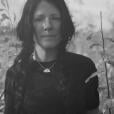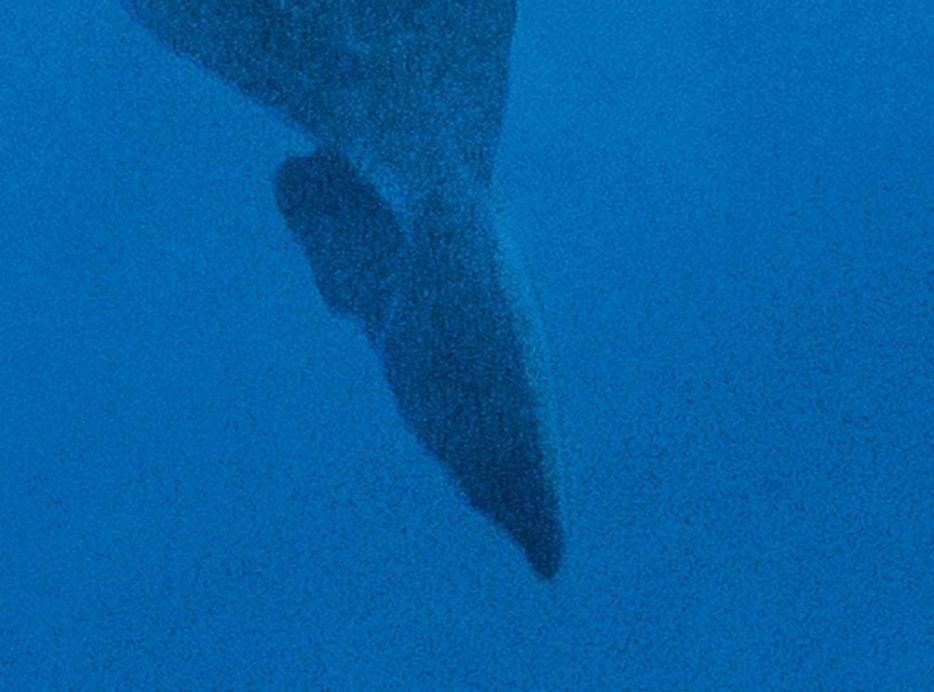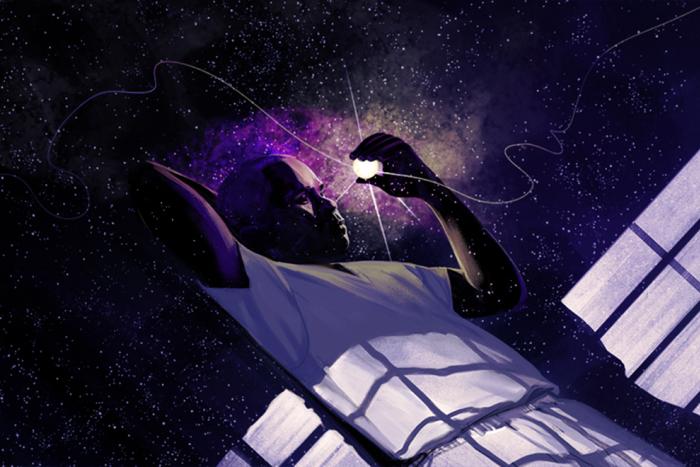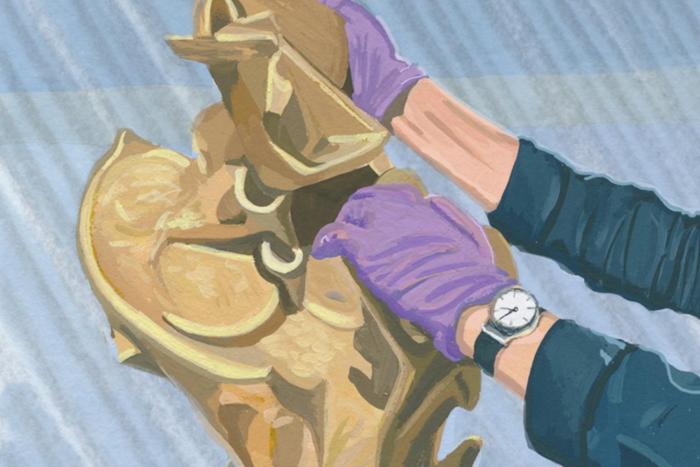We’re portaging a canoe. This is how it goes—Alecia counts, “Ready? One, two, threeeeee,” and she pulls while I push. The canoe is about nine thousand goddamn pounds and three hundred feet long. The trail is a slit, cut by a creek that’s frozen slick in places and muddy in others—sometimes just a little mud and sometimes up to my shins.
Push!
On either side of the slit it’s grass and spongy moss so uneven we can’t straddle the trail without breaking an ankle, so I have to shove the canoe along at a jogger’s pace, lifting one foot in front of the other.
Okay, push!
Since the canoe is right in front of me I can’t see where my foot is going to land, but through the glorious gift of momentum we can sometimes get going for ten to twenty steps. Breathe!
The counting, the pushing, the snap of low branches and the slop of mud is everything that’s happening in the world right now: evening news, Reddit front page, #trending on Instagram. Two muddy Métis chicks portage a canoe, and you’ll never believe what happens next!
Nothing, actually, nothing happens next. “Puuuuush,” Alecia says, so that’s what I do. She laughs, “sounds like we’re giving birth! How many kids you got?”
“None.” This sometimes gets a few raised eyebrows, but seldom brings a follow up question. Alecia nods. “Bet you’re a good aunty, though.”
“The best.”
“Well, get pushing, Aunty!” Her laugh rings out again, and I wonder where she finds the breath.
Push, keep pushing! Sometimes we take a break—you know, bent over like we’re going to puke. Only my body has surely processed the meagre offering I gave it six hours ago—a smear of cold beans on a tortilla, and a handful of cheese—that’s all there was time for. This is my second portage of the day. The morning was spent lugging a fifty-pound barrel on my back, full of food I wasn’t allowed to eat. Like some kind of psychology experiment, or a reality show. I guess reality shows are just psychology experiments with an audience. Hey, if my friends could see me now!
That’s a reference to a luxury cruise ship ad from the nineties, by the way. Which, considering where we are, makes it hilariously sarcastic. Ha.
It’s nine kilometres from the trailhead to Aberdeen Canyon, where we’ll camp for the night. One of the guides wrapped a scarf around a tree at the halfway point, so we know Alecia had already dragged the canoe four and a half kilometres when I found her on the trail this afternoon. Since then we’ve gone another two, maybe three. We should be carrying the canoe over our heads, but it’s too damn heavy. That’s what the guys do. That’s what the old-timey Voyageurs were doing in the artist renderings I googled before the trip. Convincing myself that I have some kind of blood connection to the land, even though I come from the city. Dumbass. I think the only thing I hate more than the land right now is this goddamn canoe.
“Just think of how amazing your ass will look when this is done,” Alecia says.
“As amazing as a forty-year-old ass can look,” I grunt, but she’s got a point. I can only imagine how buff we must look under all our layers of polar fleece and down and Merino wool. Paddling fifty kilometres a day, eating beans and rice and dried fish. I haven’t seen much of my body since we launched the canoes on the Ogilvie, right off the side of the Dempster highway. The thought of exposing any additional skin to the late August air is heinous. It may still be summer but there’s frost on the tent in the mornings, and ice in the shade all day. Nope, I’ll remain sheathed in a base layer until we get to Fort McPherson, seven long days from now.
Alecia’s face is thinner than when we started and her skin is glowing. Kind of flushed and sweaty right now, though—sticks in her hair and mud on her chin. It suits her. The last time I saw my face—a quick glance at a mirror shard in a roadside outhouse—it looked pale and worried. Worried that twenty-one days may be too ambitious for a first canoe trip. That’s me, an ambitious dumbass.
“You look good for forty,” Alecia says. The standard response for a new female friend, whether it’s true or not. “Ready?”
“Ready.”
Push! Alecia’s really got her run on this time, maybe like, thirty steps. “You got this!” she yells, over her shoulder. My smile is a rictus. Brain screaming at limbs: Push you sonsofbitches. I think about all the jogging I did to get in shape for this moment, in my new runners and cute little shorts. Along the seawall at dawn, over the Granville bridge, past women half my age. How the last few kilometres usually felt like they were taxing my body to its Olympian potential. Clearly, I was wrong. This, now, is the marathon of pain that will define all other pain from here on in. I was warned about the portage when I signed up. But when you’re told something is going to hurt, all you can measure it against is the other pain you’ve endured. City life is cushy.
Push. Damn, the bottle of ibuprofen will take a hit tonight. Push. Maybe I can trade back massages with someone. Puuuuush. Think about my ass, think about my ass, think about my hot, hot ass until that doesn’t work anymore. Then, think about onion rings.
“Okay, jerky break.” Alecia pulls a hunk of moose jerky out of her jacket and tears me off a piece. “High five.”
“Oh man, thanks.” I’ve turned my nose up at the jerky before today, since I’m a vegetarian. But to say no to food right now would be insane. I’d eat bug jerky if she offered it.
The canoe rests easily at hip height on the thick grass; Alecia and I lean against it and look out on this land I’m trying to make friends with. The trail runs parallel to the Peel River—crashing its way through a narrow canyon that would have certainly killed us if we’d tried to run it. That’s what’s the guides say. We’re not close enough to the cliff edge to see the Peel, but we’ve got a panoramic view of the valley: scrubby black spruce and willow bushes, bare-ass mountains in the distance. Meh. Around us, tufty grass swishes in the wind, which is always, always freezing. The sun is down but the sky will stay bright for several hours. If we’re lucky, Alecia says, the northern lights will come out before it even gets dark. I haven’t seen them yet, not in person, I mean. I’ve googled them.
“Do you think everyone else is waiting?” I ask. There’s ten of us in total, eco-tourists from all over. Alecia took me under her wing pretty quick when I told her it was my first trip. Her family’s from Winnipeg, but she lives in Dawson now—can’t even remember how many canoe trips she’s done.
She shrugs. “Tell me a story, the better it is, the longer break we’ll get.”
“What if it’s the best story ever told?” I ask.
“Then we’ll sleep here tonight,” she says. “Hope you wore your long undies!”
“Okay, I’ll tell you a mediocre story.”
“So, like most of your stories so far.” She ducks my punch, expertly. Must have brothers.
“Shut up and listen. Two women were standing on the shore of a big lake, just before sunset. The water was a strange shade of blue, like teal or turquoise. They could see things floating past, big boxy things. It took them a while to figure out the big boxy things were ovens.”
“Ovens? Like, Maytag?” She tilts her head back and I can tell she’s picturing it.
“And some washing machines, too,” I say, “But mostly ovens. They floated along for a bit just below the surface of this beautiful teal water, then they sank, leaving a trail of bubbles. The lake was deep, so they disappeared completely. Who knows how many. ‘Where are they coming from?’ the younger woman asked. The older woman didn’t hear the question, because she was focused on a really ornate, old-timey oven that seemed to be floating towards her. Like from a pioneer house or something.
“Suddenly the older woman was underwater, facing the oven, and it was getting closer and closer. The door started to open, like it was going to swallow her up, but she wasn’t really afraid. Just curious how it got there, and how something so heavy could float at all.”
“Was she drowning?” Alecia asks. “Since she’s underwater and all.”
“Don’t interrupt. She could breathe underwater, or maybe she was holding her breath. The oven got closer, and when the door was fully open there was just a black void inside, and okay, yeah, she got nervous. But then she saw something else. Whales.”
Alecia snorts. “Lake whales!”
“Shhh! She watched them swim around for a bit, and when she turned back, the old-timey oven was sinking down to the bottom of the lake. Then suddenly she was on the beach again. The younger woman hadn’t noticed her disappear. The sun had set, but now the lake was full of phosphorescence so all the movement in the water left sparkling tracers. The blocky outlines of the ovens were gradually replaced by the graceful swimming of the whales, and when the two women ran down to the shoreline to get a closer look, their barefoot steps left glowing prints in the sand.”
We’re quiet for a minute, as I hold the image in my head. “Did you really just make that up?” Alecia asks.
“It was a dream I had last night. I was the older woman.” I let the last bite of the peppery jerky dissolve on my tongue, mostly stalling for time, but Alecia stands up and motions for me to get moving. She’s a tank.
Pretty soon the trail narrows so much we have to lift the canoe up on its side, shoving it through tightly packed trees before we can put it down again. We pass a couple of canoes that have been left for tomorrow. We could do the same, but Alecia wants to see this through. As much as I hurt, I feel the same way. I’m kind of proud I’ve held up this long—it’s weird to see how much further a body can go past the point you’d normally just pack it in. But my muscles are failing now, really failing, despite the jerky and my borrowed resolve. I trip and fall, and have to let go of the canoe to keep from pulling Alecia backward. It’s weird how hitting the ground doesn’t really hurt, how banging my pulpy fingers and bumping my head registers on some distant nerve endings I’m no longer friends with.
“Hey, listen.” Alecia holds up a finger and I hold my breath. Moose? Bear? No. We can hear voices, faint, but definitely there. I’d almost forgotten about the others. They must be wondering where the hell we are. They must want to eat dinner, oh man, dinner!
“What would you eat right now, if you could eat anything?” I ask.
Alecia doesn’t hesitate. “Chocolate. Which reminds me, I’ve got a treat for us tonight.”
“Is it chocolate? I’ll push for chocolate,” I say, imagining sundaes, s’mores, the feeling of a Kit Kat melting in my hands from the fire’s heat.
“I’ll pull for chocolate!” Alecia takes the bow line over her shoulder, and for the millionth time today, we begin again.
“I’ll push for deep-fried Mars bars,” I say.
“Imagine.” Alecia gasps, “or yam fries.”
“With that mayo, what’s it called?”
“Aioli.”
“Yeah.”
“Fry bread.”
“With raspberry jam.”
“Natch. Lemonade.”
“And grape soda,” I say. My body burns. “I don’t even really like it, but I want some now.”
“Dr Pepper slushies,” Alecia says.
“Gross.” Breathe. Walk on glass ankles, push, keep pushing.
“Swampwater,” she says.
“What’s that?”
“When you mix all the slush flavours together.”
“Ew. Delicious.”
“Hey, did you know ovens are wombs?”
“Huh?”
“In the dream dictionary. Wombs.” Alecia stops, and I almost mow her down, a low-speed canoe collision. “Not that dream dictionaries are always right, just saying. Look.”
She points downhill, and I can see a tiny flicker. The campfire. I know where we are now, the steep hill that leads to the trailhead, and beyond that, the canyon. We push the canoe to the very edge of the hill. It’s pretty dark, so we click on our headlamps. The descent is a muddy crevice, with rounded walls high enough to make it seem like a tunnel. After two days of hikers stomping through, it’s probably slippery.
“I’m done, I’ll break my neck if we try to take this down there,” I say.
“Oh, we’re not going to carry it,” Alecia says, waggling her eyebrows. “Push.”
“Push?”
“Do it.”
Well. Alecia may have pulled the canoe nine kilometres but I gladly push that sonofabitch down the crevice. Our headlamps shine a spotlight on its journey, narrowly missing a rock and shooting out neatly at the beach.
We high-five. Unsteadily follow the canoe’s path, toward the light. Not gonna lie, I slide down on my bum. Alecia lets out a shrill whistle and the shadowy figures of our campmates stand up around the fire, applauding. Alecia hugs me close as we walk in together. She is definitely a tank, the most beautiful tank I’ve ever met. “What do whales mean?” I ask her.
“Were they killer whales?”
“I think they were sperm whales.”
“Like Moby Dick?”
“Does it matter what kind of whales they were?”
“I think it matters more how you felt about them,” Alecia says. “Also, haha, you said sperm.”
“Immature. You said dick.”
“Whatever.”
I imagine us walking up to the fire like that slo-mo scene from Reservoir Dogs, “Little Green Bag” playing in the background, but it probably looks more like a zombie shuffle. A bowl of chili is placed in my hand, and a hunk of cornbread in the other. From my vantage point, ass plunked down on a cold river rock, the canyon walls rise up so high only a sliver of sky is visible. No northern lights, yet. “Girl, keep watching, you’ll see some.” Alecia says. “You got this.”
Excerpted from Last Woman by Carleigh Baker, McClelland & Stewart, 2024.






